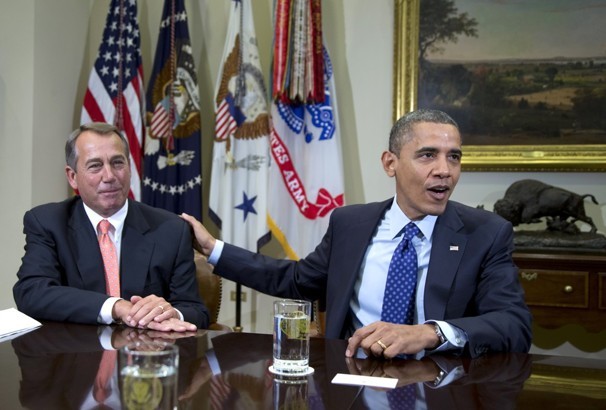So this is what Congress and President Obama meant by “balance” in addressing the “fiscal cliff”: $42 of tax increases for every dollar of spending cuts.
It also apparently meant doling out billions of tax dollars to industries including movies, rum manufacturing, auto racing, and alternative energy.
2013 began with Congress passing $620 billion in tax increases and $330 billion of new spending over the next 10 years to avoid expiration of tax cuts that became law in 2001 and 2003. Some other tax provisions that were not part of the “Bush” tax cuts also were affected. Automatic spending cuts totaling $1.2 trillion over the next 10 years also were put on hold.
Complaints Across Political Spectrum
The deal appears to have pleased few people on the political Left or Right.
The Left-leaning American Sustainable Business Council and Business for Shared Prosperity released a joint statement explaining their disappointment the deal “does not restore the revenues needed to rebuild our damaged economy and provide modern infrastructure for long-term business success. The deal also continues the destructive myth that upper-income tax cuts create jobs. They don’t.
“Investment in education, research, infrastructure and economic development in our communities creates jobs and increased consumer demand,” they wrote. “As Washington addresses the delayed sequester and debt ceiling, Social Security, Medicare and other programs vital for our people and economy must be strengthened, not cut.”
Richard Trumka, president of the Left-leaning AFL-CIO union labor organization, praised the deal because it does not touch Social Security, Medicare or Medicaid benefits, ends the Bush-era income tax cuts for families making more than $450,000 a year, and extends unemployment benefits for a year.
Mixed Labor Union Response
But in a statement, Trumka also complained, “The deal extends the Bush tax cuts for families earning between $250,000 and $450,000 a year and makes permanent Bush estate tax cuts exempting estates valued up to $5 million from any tax. These concessions amount to over $200 billion in additional tax cuts for the 2 percent.
“And because of Republican hostage taking, the deal simply postpones the $1.2 trillion sequester for only two months and does not address the debt ceiling, setting the stage for more fiscal blackmail at the expense of the middle class.”
National League of Cities President Marie Lopez Rogers, Mayor of Avondale, Ariz., also said in a statement, “”[W]e are disappointed that the automatic spending cuts to important federal programs that our cities and families rely upon continue to be an option in resolving the nation’s fiscal challenges.
“Over the last several years, these programs, which support infrastructure, job training, housing, and education investments, have already been subject to significant cuts in the name of deficit reduction.”
Shared Responsibility
On the Right, ForAmerica Chairman Brent Bozell issued a statement in which he called the bill “a surrender. The problem our nation faces is over-spending, and spending is ignored: the perfect Washington, DC ‘solution.’ And not only does this bill fail to make meaningful spending cuts, it actually spends another $4 trillion we don’t have!”
The Republican-controlled House of Representatives voted 257-167 for the bill. Bozell said that vote means “the GOP loses its soul and co-owns the resulting fiscal disaster with President Obama.”
“House Republicans gave lip service to spending restraint, and especially entitlement reform, but managed to play their hand so clumsily that no significant cuts in spending were included in the final deal. The net result of all of this sturm and drang is that the deficit will actually increase as a result of the final bill,” said Marilyn R. Flowers, professor of economics at Ball State University.
“At the end of the day, the only way to get out of the dangerous mess we are in is if we all make sacrifices. And that is what no one seems willing to do,” Flowers said.
Though much of the fiscal cliff rhetoric focused on higher taxes on the “wealthy,” a 2 percentage point reduction in the Social Security tax that was enacted two years ago was allowed to end, forcing almost everyone with a job to pay more. With the extra 2 percentage points on the tax rate, a family that earns $50,000 a year will pay another $1,000 toward Social Security taxes.
Higher Incomes, Higher Tax Rates
For individuals earning more than $400,000 and families earning more than $450,000 a year, taxes on income, capital gains, and dividends all go up. Taxes on estates of more than $5 million at a person’s time of death also go up. Tax deductions and credits also were limited for those who earn more than $250,000 a year, effectively raising their tax rate because more of their income willl be subject to tax.
The extra $330 billion in spending results from extending unemployment benefits, a “doc fix” patch to prevent cuts to Medicare, and extension of agriculture subsidies.
The deal also delayed by two months automatic spending cuts that were to happen at the start of the year, setting up another likely fight over spending.
The Treasury Department has announced the federal government’s debt ceiling likely will be hit in late February. To keep spending and borrowing, the debt ceiling would need to be raised. The other alternative would be to reduce spending and use the savings to make interest payments without raising the debt ceiling.
“There are obvious omissions and difficulties with the agreement — chief among them the almost non-existence of spending cuts, particularly cuts in defense. But the alternatives to the Republicans were little or none,” said Bob Ekelund, Catherine and Edward Lowder eminent scholar emeritus at Auburn University. “Spending cuts will have to be negotiated soon, so there is hope and a very probable catastrophe was avoided. After all, the Republicans lost the election.”





